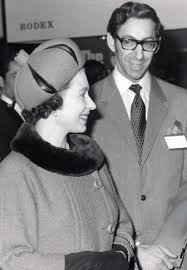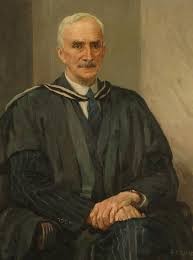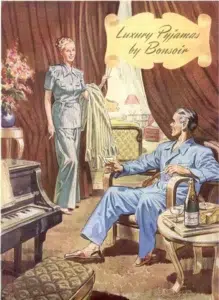THE PYJAMA GAME
Derek was born in Margate whilst his family were on their annual holiday.

He grew up in London, initially living in Golders Green and then Hampstead Garden Suburb.
Derek’s father was Jack Lewis Rose. His grandfather, Joseph Rosenberg, was a cabinet maker who had emigrated from Russia. He anglicised the family name to Rose.
Derek’s mother was Rosa Weisblatt. Her father, Abraham, had emigrated from Poland. He was a bootmaker.
Both of Derek’s grandfathers lived in the East End of London and prospered there.
Derek’s father, Jack, met Cecil Barnes, a cutter, whilst they were working in a shirt factory in Clerkenwell. In 1926, they set up a company together, making pyjamas – a new fashion that had just come from India brought back by British army officers, but the term only applied to the trousers. Jack and Cecil added the jacket – inventing pyjamas as we know them today.
They called their product ‘Bonsoir’.
The company was immediately successful and soon Jack and Cecil were supplying luxury nightwear to both Selfridges and Harrods. They built a state-of-the-art factory in Stoke Newington (three storeys) and soon they were able to open a second one in the west country.
The Rose family were living in London when the Blitz started. It was only when an incendiary bomb fell through their garage, destroying his Jack’s beloved Hillman Minx convertible, that it was decided to evacuate the children.

Jack, stayed in the city, refusing to leave his sparkling new factory. The firm won a government contract to supply pyjamas throughout the war.
Derek was initially sent to Chard in Somerset and then onto Hertfordshire where he attended Berkhamstead Grammar School.
He came back to live with his family when the Blitz ended – just in time for V1 and V2 rockets to land on the city.

Derek collected bits of shrapnel which he kept in his bedroom.
His other great pleasure was going to the BBC headquarters, to watch radio shows being broadcast. ITMA (‘It’s That Man Again’) was his particular favourite.
Derek went to the City of London School for an interview, accompanied by his father. Derek had a terrible stammer and was extremely nervous. He remembered he could not get any words out – but the Headmaster, Mr. F.R. Dale (a First World War Military Medal winner), was a kindly man who put Derek at ease and accepted him to the school.
Derek loved it there and excelled at mathematics, once winning a prize which was presented to him by the Lord Mayor of London. His form tutor was ‘Boggy’ Marsh, a former Air Force flyer.

Derek joined the school army, run by another war hero, Colonel BIF Vokins. The boys were taken to an old shelter which had been converted into a rifle shooting range. The targets were held up by a wire.
Derek’s first shot split the wire, and all the targets came crashing down to earth.
When they were put back up, Derek’s second shot took out the only light bulb, plunging them all into darkness. Colonel Vokins bellowed, “Rose, get your eyes tested tomorrow.”
From that day on, Derek always wore glasses.
Once he could see, he was proud to become a crack-shot.
Derek finished his education by studying textile design and manufacture at the Royal Technical College in Salford. His father had a buyer in Manchester whom he visited weekly – and this man arranged a place for Derek.
The college class had 85% foreign students. Derek loved the diversity of it, igniting his passion for foreign travel.
Derek joined his father’s business in 1953.
His father, Jack, was known as a feisty businessman, frequently clashing with many of the company’s buyers. Gradually, Derek began to take over from his father.
Derek had a much calmer temperament, and people preferred to do business deals with him. “His tact and enthusiasm endeared him to store buyers who had sometimes clashed with his father.”
Derek shifted the emphasis of the company to export, and increased sales by two thirds. He travelled the world, wooing upmarket retailers.
Amongst many other places he visited, Derek went to Lagos, Lisbon, Hong Kong and Paris. In the French capital, he met the very conservative Madame Yvonne de Gaulle – who would only wear Bonsoir nightwear.

By the late 1950s, Derek had taken control of the company, becoming Managing Director.
However, his father, Jack, sold Bonsoir in 1961, although Derek remained working for the company. The brand name ‘Bonsoir’ was retained.
In 1968, Derek married Annette Krotoschin, a jewellery designer. They had two children – Nancy and Alexander (always known as Sasha).

The following year, Derek accompanied Queen Elizabeth 2nd to the International Menswear Exhibition, representing British fashion.

His pyjamas were worn by John and Yoko Lennon (matching his ‘n’ hers) in their ‘bed-in’ anti-Vietnam War protests in Amsterdam and Montreal (1969).
Both the Queen Mother and future President of the USA, Gerald Ford, were wearers of Bonsoir nightwear.
In 1975, the parent company went into receivership. Derek bought the name and went into partnership with his brother-in-law, John Randall. Derek swore the company would never leave family control again.
They opened a factory in Congleton, Cheshire and imported fine cloth from Czechoslovakia.
Derek built a loyal team around him, taking quality workers from the old, defunct company. His banner was ‘Derek Rose – London’.
He told his sales staff, “Make friends with the customers you’re going to sell to – then you’re halfway to selling your merchandise.”
Derek won the Queen’s Award for Export on two occasions.
Eventually, Derek became chair of the British Menswear Guild and led many delegations to international trade fairs.
In later years, his daughter Nancy Pagani ran the company with Derek.

Derek retired in 2003, and Nancy stepped down too. His son, Sasha, took over the leadership – although Derek retained an active interest in the business.
Sasha negotiated a deal with Net-a-Porter in 2005 and expanded into the USA.
Bonsoir supplied Eddie Redmayne, Harry Styles, Sarah-Jessica Parker and Leonardo Di Caprio with pyjamas – as well as many more famous names.
They opened four shops in London, including Knightsbridge and Marylebone, and shops abroad in Toronto, Dubai and Riyadh – as well as twenty other international retail outlets. They continued to sell their wares to over fifty countries – and expanded into loungewear, leisurewear and underwear.
Aged ninety-two, Derek was awarded the honour of ‘Freeman and Guild Member of the City of London’. This gave him the right to drive sheep over Southwark Bridge – which he promptly did.
Derek was known for his craftsmanship and his belief in hard work. Wherever possible, he worked with local factories and tradespeople. He had a strong relationship with mills, manufacturers, agents and retailers.

He was also regarded as a true gentleman – everybody loved him. Derek was known as the most honest man in the business.
Derek was called, “A classic British menswear visionary.”
At his death, the company said, “Derek was a mentor, a gentleman and a friend…We will miss his warmth, his humour and his unwavering support.”
RIP = Reputation In Pyjamas

































